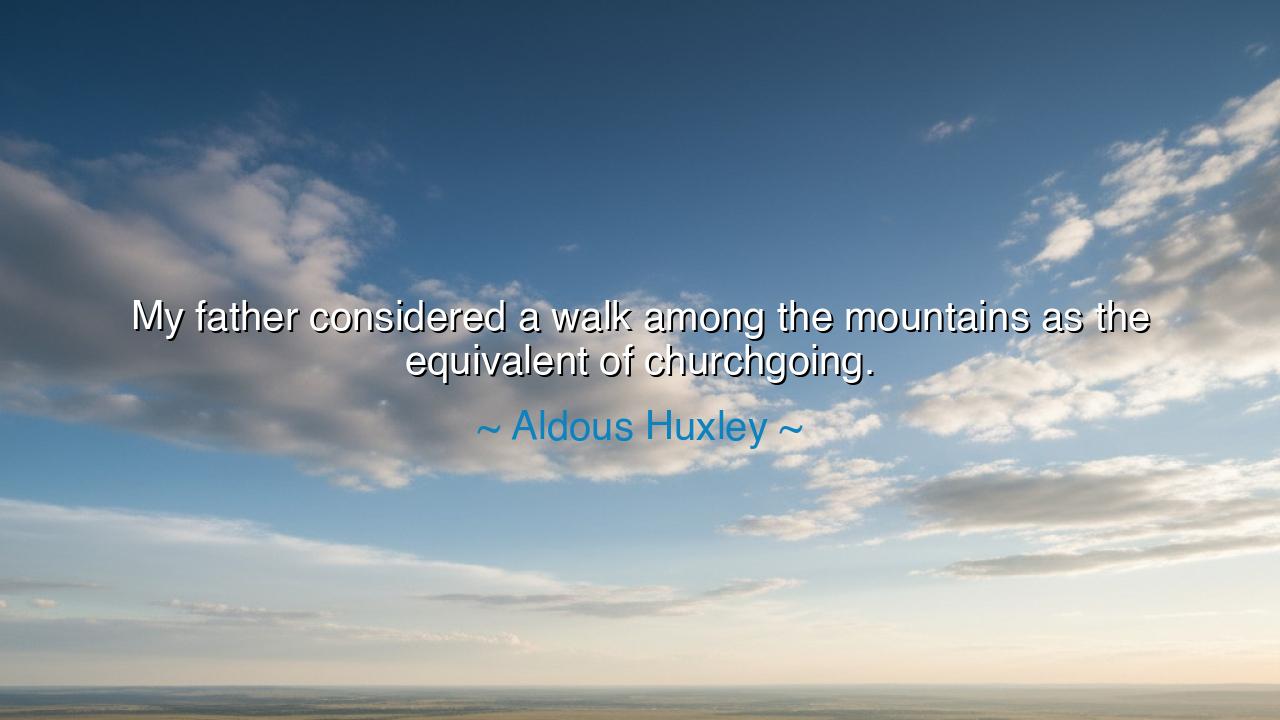
My father considered a walk among the mountains as the






The words of Aldous Huxley — “My father considered a walk among the mountains as the equivalent of churchgoing.” — carry within them a truth as ancient as the hills themselves. For in the mountains, the spirit of man encounters the majesty of creation, unshaped by human hand, unbroken by time. To some, holiness is found within walls of stone, where hymns rise like incense; to others, like Huxley’s father, holiness is found in the vast silence of the peaks, where wind and rock bear witness to the eternal. The mountains are a sanctuary not built by men, but raised by the hand of the Eternal, a cathedral of sky and stone.
This thought is not born of rebellion against the temple, but of recognition: that the soul seeks communion with what is greater than itself, whether in shrine or in summit. The ancients knew this well. The Greeks ascended Olympus, calling it the home of the gods. Moses climbed Sinai to receive the law of heaven. The hermits of the desert fled cities and cloisters alike, finding the presence of God more vividly in the silence of rock and sand. Huxley’s father walked this same path of wisdom: in the stillness of the mountains, he heard a sermon without words, a prayer without tongue, a sacredness that no man could diminish.
Consider Francis of Assisi, who spoke to birds as brothers and called the sun his kin. For him, the open sky was the true dome of a church, and every stone was an altar. Was his walk among the mountains less holy than the chants of a monastery? Nay, it was perhaps more so, for in those quiet places he felt the pulse of creation itself. So too, Huxley’s father found that a journey into the wilderness cleansed the heart, renewed the spirit, and humbled the soul before grandeur that no sermon could match.
The meaning of this teaching is clear: worship is not confined. One may kneel upon marble or stand upon granite and still behold the sacred. The truest churchgoing is not always where man dictates, but where the soul feels awe, gratitude, and humility. For what is worship if not the recognition of our smallness before what is vast, and of our dependence upon what sustains us? In the whisper of pines, in the rush of streams, in the silence of snowbound peaks, there is a holiness that speaks not to the ear, but to the very marrow of our being.
Yet, let no one mistake this truth as a scorn of tradition. There is honor in gathering with others to lift voices in common praise. But Huxley’s father reminds us of a balance: that even as men build temples, the earth herself is the first and greatest temple, where no man is denied entrance, and where the only price of admission is humility. When one walks among mountains, one enters a sanctuary where no sermon need be spoken, for every stone declares, “Be still, and know.”
The story of John Muir, the great wanderer of the American wilderness, also shines here. He roamed through Yosemite’s cliffs and valleys, declaring them to be not just beautiful, but sacred. He wrote that in wildness is the salvation of the world. Muir knew, as Huxley’s father knew, that to walk in the grandeur of nature is to step into a realm where the soul communes directly with the Infinite. It is not idleness, nor mere pleasure, but worship, deep and unspoken.
So, my children, take this wisdom to heart: do not seek the holy only within the walls of men. Lift your eyes to the ridges, let your feet climb the paths of earth, and allow your spirit to be humbled by sky and stone. Take time to walk in silence, to breathe the thin air of heights, to feel yourself small beneath the mountains yet great in the kinship of all creation. In these moments, you will know what Huxley’s father knew — that a walk among the mountains may be as sacred as any prayer, as hallowed as any temple.
Thus, the practical counsel is simple: when your spirit is weary, go to the mountains, or if not the mountains, to the trees, to the rivers, to the open fields. Walk slowly, in reverence. Let nature itself be your scripture, let silence be your hymn, let wonder be your prayer. And you shall find, as countless souls before you have found, that the earth is a vast cathedral, and every step within it is a step into the presence of the Eternal.






AAdministratorAdministrator
Welcome, honored guests. Please leave a comment, we will respond soon